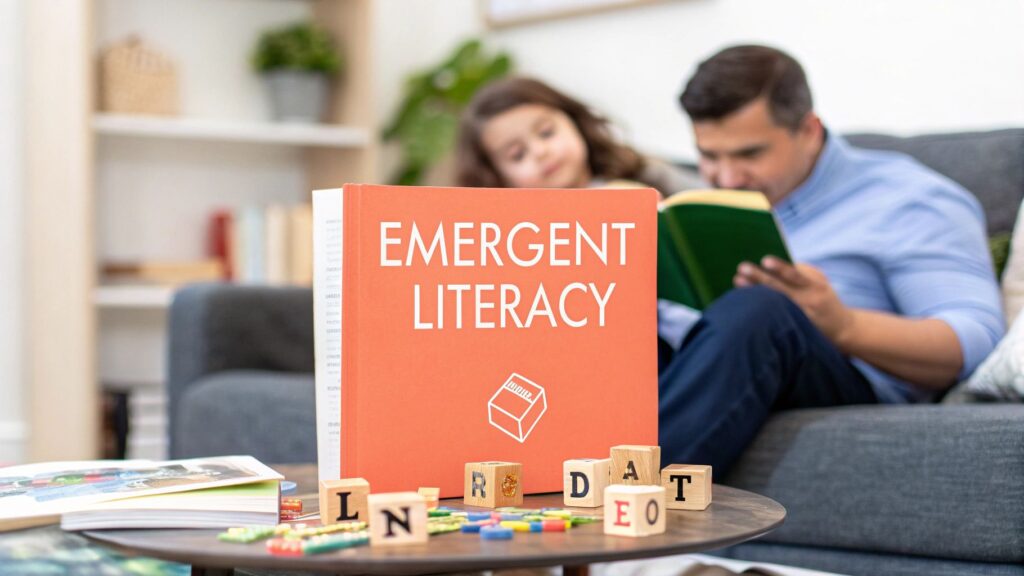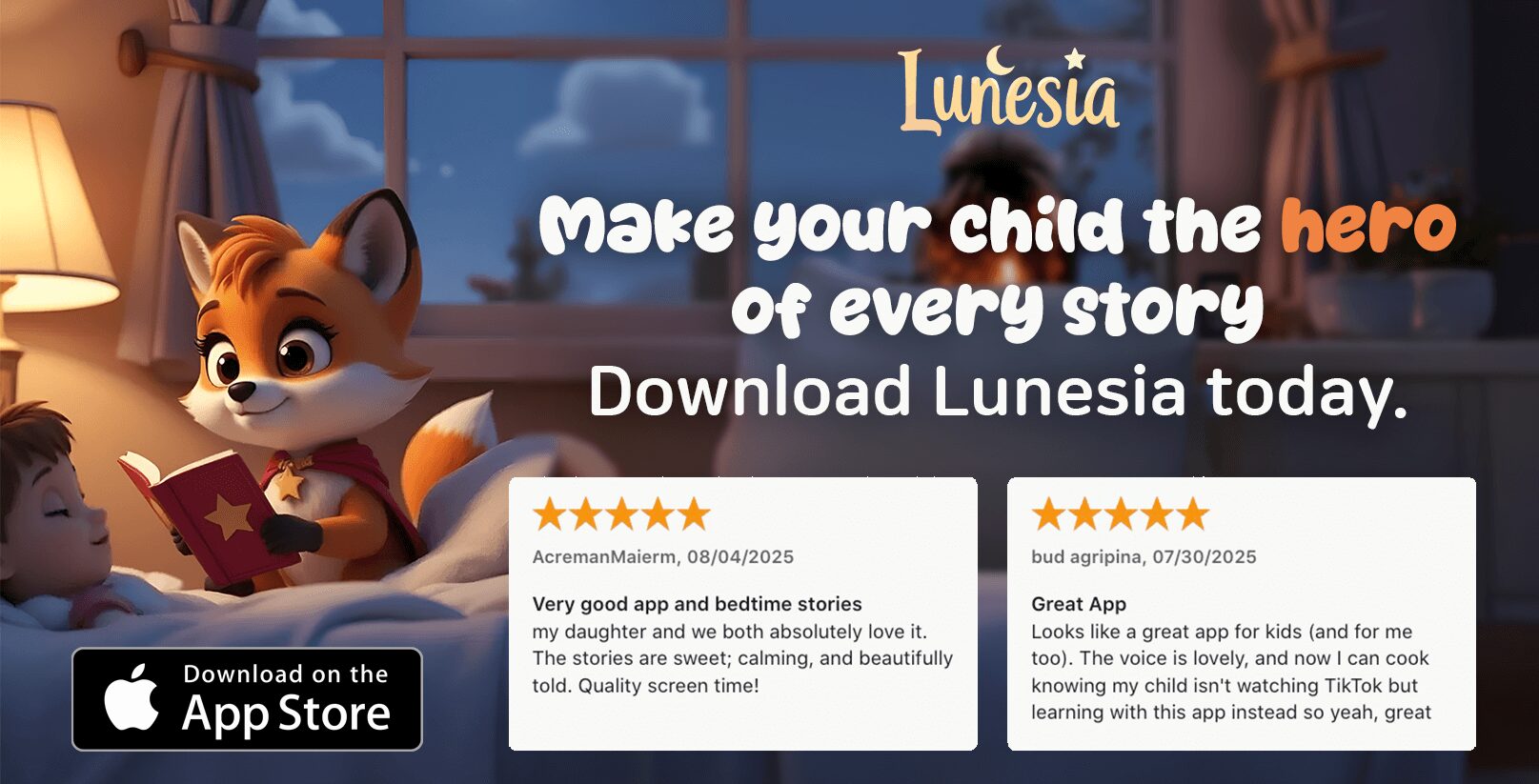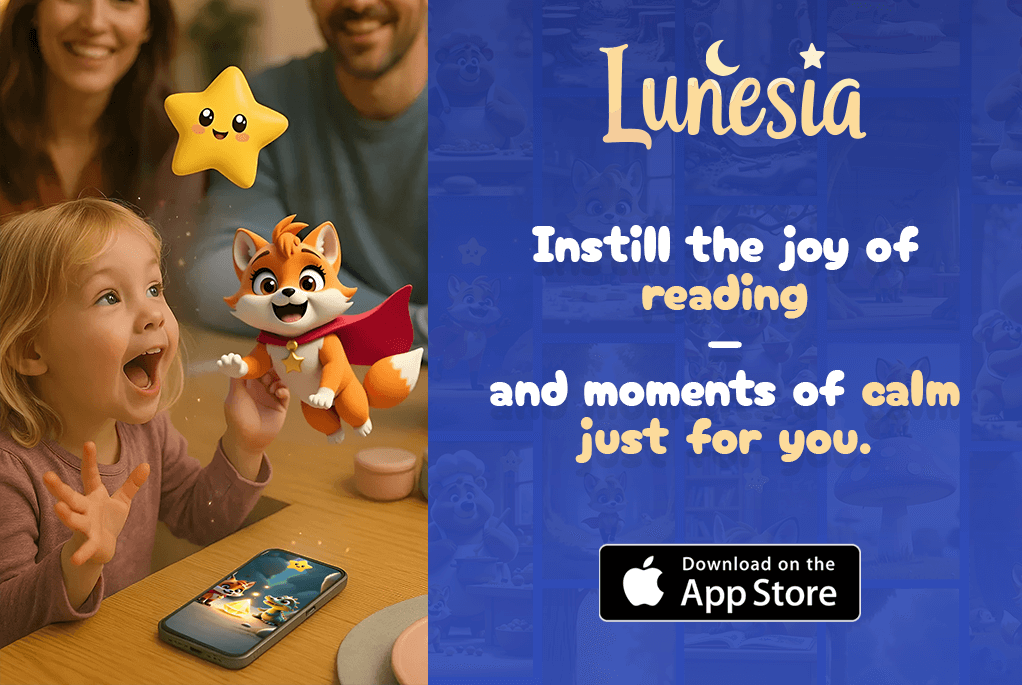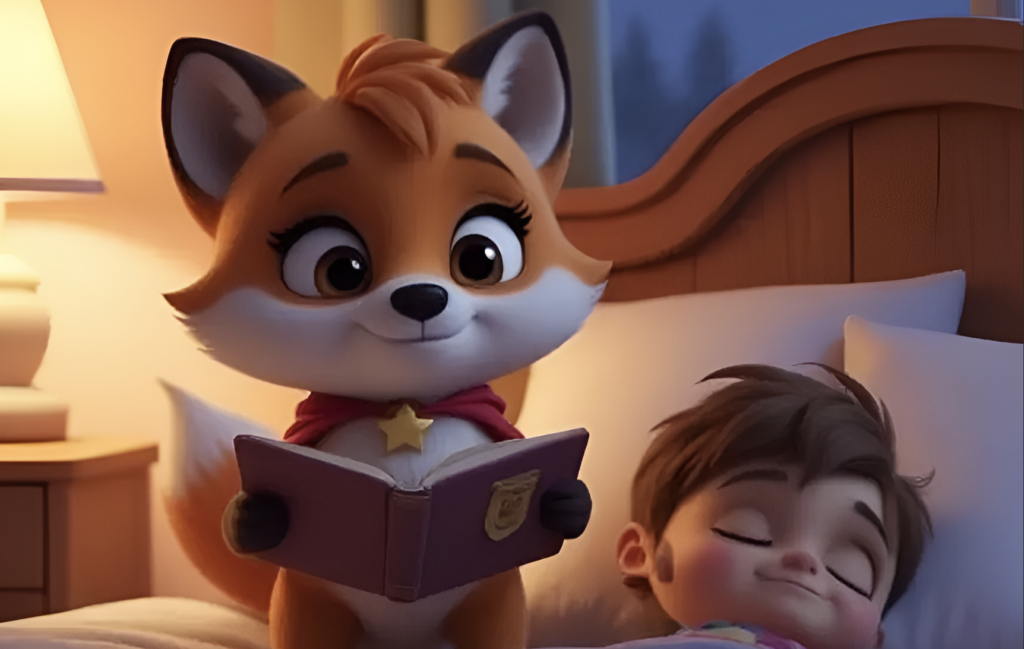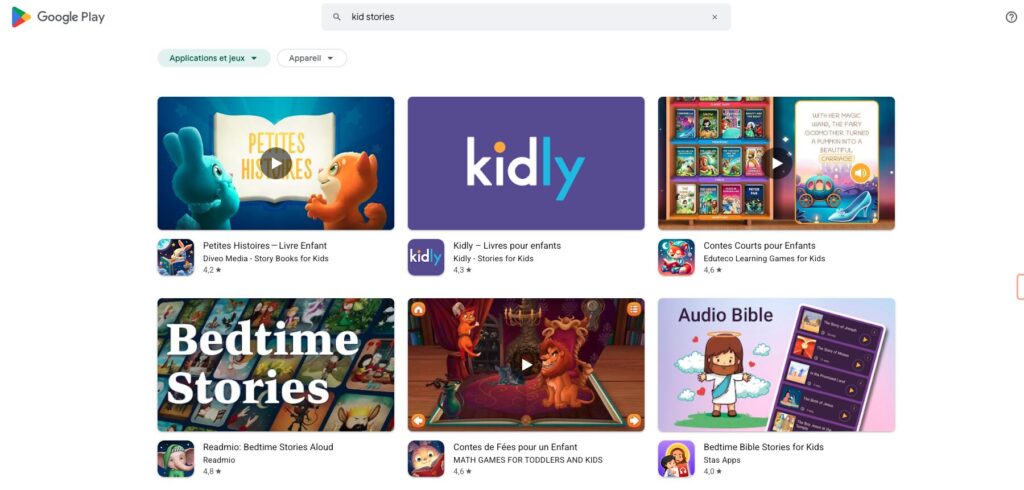Have you ever watched your two-year-old “read” a favorite picture book from memory, turning the pages at just the right moment? Or seen your preschooler point to a big red sign and shout, “Stop!” long before they actually know the letters? How does that magic happen?
This isn't an overnight trick—it's the beautiful, gradual unfolding of skills called emergent literacy. It's everything your child is learning about reading and writing before they can actually read and write. And the best part? You're already their most important teacher.
Your Child Is Already Becoming a Reader
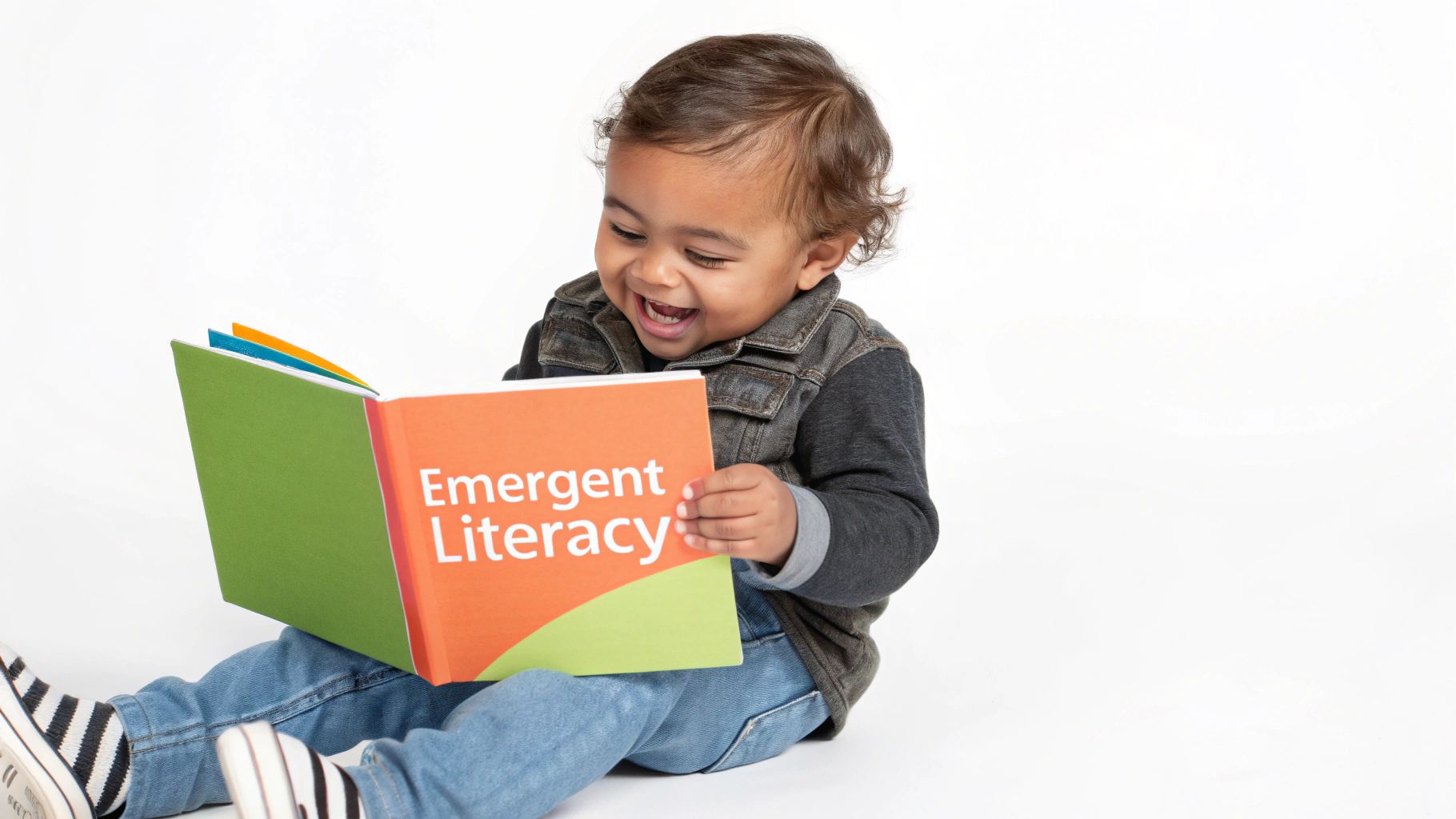
Does "emergent literacy" sound like something you'd hear in a parent-teacher conference? Let's have a coffee-chat about what it really means. Think of it as building a house. You wouldn't put up the walls without a strong foundation, right? Emergent literacy is that foundation—built brick by joyful brick, through every song, story, and silly conversation you share.
When your child scribbles on a piece of paper and proudly tells you it’s a letter to Grandma, that’s emergent literacy. When they hold a book upside down at first, then figure out the right way to hold it, that’s a huge leap forward. These aren't just adorable moments; they are powerful signs that your child is cracking the code—that all those squiggles on a page actually mean something amazing.
What This Looks Like in Real Life
Wondering if you’re doing enough? I promise, you already are. This isn't about flashcards or formal lessons. It’s a continuous, beautiful process that blossoms through everyday play and connection, typically from birth to around age seven.
You are nurturing a future reader every single time you:
- Sing the alphabet song (even if you get a few letters mixed up).
- Ask them to tell you about the best part of their day.
- Point out the big "M" on the McDonald's sign.
- Snuggle up for just one more bedtime story.
These simple, love-filled activities are infinitely more powerful than drills. They teach your child that language is fun, exciting, and a source of deep connection. Looking for more easy ways to weave this into your day? Check out our ideas for boosting early literacy skills at home.
Here’s the beautiful truth: you don’t need to be a teacher to support your child's literacy journey. You just need to be a parent who talks, plays, and shares stories. The rest will follow.
And what if you could make those stories even more powerful? Imagine an adventure where your child doesn't just listen but gets to decide what the hero does next. That's the magic of Lunesia—an app with interactive stories that turn passive listening into active problem-solving. While they're joyfully helping a brave knight or a friendly dragon, they’re building vocabulary, empathy, and resilience, all in a safe, ad-free world.
And for you? It's that rare, precious moment of peace, totally guilt-free, knowing they're engaged in something that’s truly good for them.
The Six Pillars of Future Reading Success
Have you ever wondered what makes one child devour books with joy while another struggles to sound out a single word? It's not magic, and it’s certainly not about who was pushed to read first. It all comes down to building six powerful, foundational skills—the pillars that will hold up their entire future as a happy, confident reader.
Think of these pillars less like a daunting checklist and more like ingredients in your family's secret recipe for success.
From Squiggles to Stories
The journey from seeing marks on a page to understanding they tell a story is a huge cognitive leap. It starts with two key pillars.
-
Print Awareness: This is that incredible "aha!" moment when your child realizes that the writing on a sign or in a book actually carries a message. It’s when they start holding a book the right way up or tracing the words with their finger. A simple trip to the grocery store becomes a powerful lesson when you point to the sign for “bananas” and connect the word to the fruit in your cart. It’s that simple!
-
Narrative Skills: This is just a fancy way of saying "the art of storytelling." Can your child tell you about their day at the park in a way that makes sense? Or retell the story of The Three Little Pigs in their own words? This skill is all about understanding sequence (first, next, last) and cause and effect, which are the absolute cornerstones of reading comprehension.
The following infographic shows how these early skills don't just create readers—they build well-rounded, thoughtful little humans.
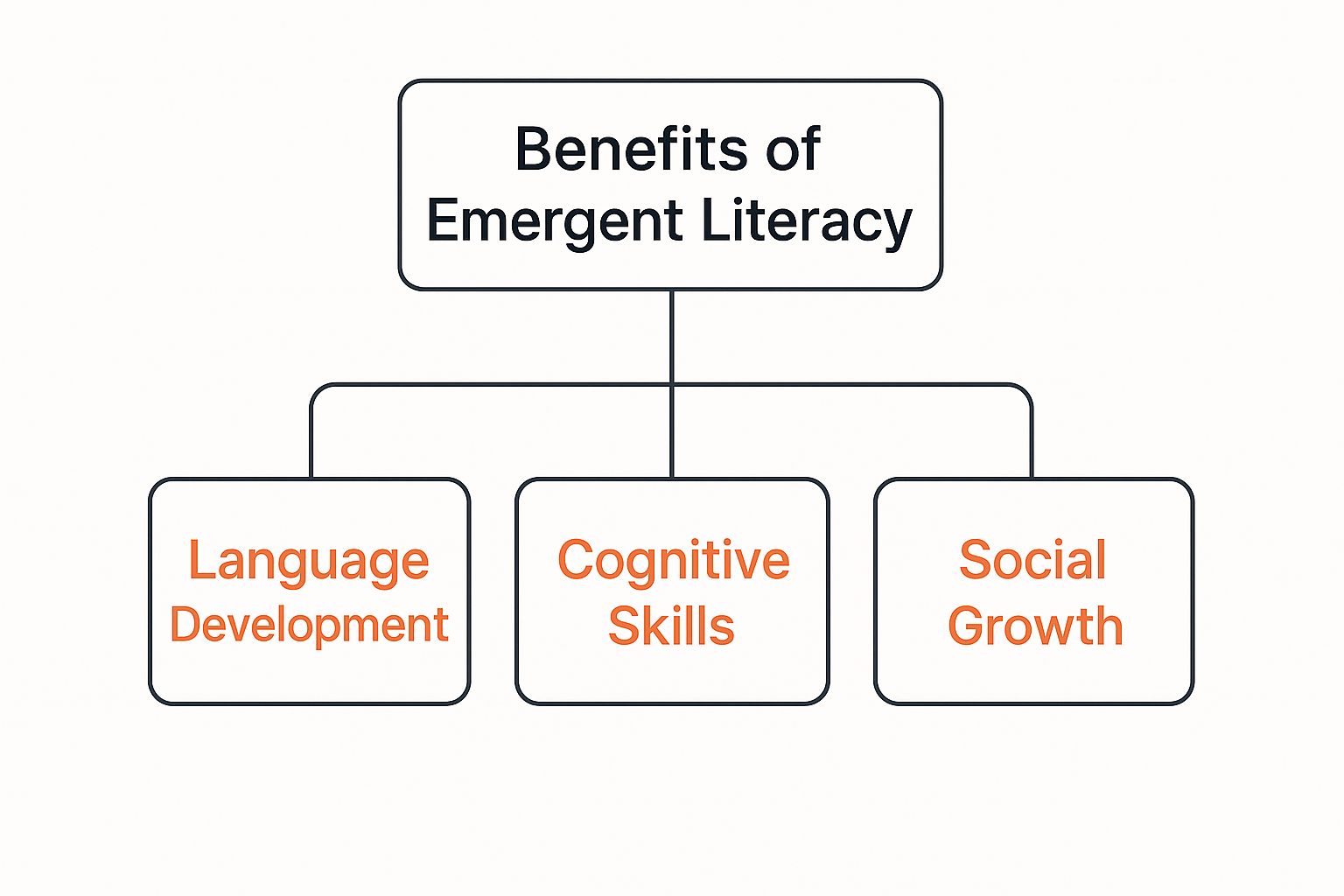
As you can see, you're nurturing their cognitive, social, and emotional growth all at the same time.
The Power of Words and Sounds
Once a child gets that print tells a story, they need the tools to unlock its meaning. That’s where the next pillars come in.
-
Vocabulary: Did you know that a child's vocabulary at age three is one of the single greatest predictors of their reading ability in third grade? It's not about knowing "big words." It's about having a rich well of words to understand the world and express big feelings. When you're on a walk and say, "Look at that enormous tree!" instead of just "big tree," you're building this pillar, one word at a time.
-
Phonological Awareness: This one sounds complicated, but it’s pure fun. It’s the ability to hear and play with the sounds in language. Clapping out the syllables in a name (So-phi-a!), making up silly rhymes ("cat," "hat," "bat"), or noticing that "mommy" and "milk" start with the same sound are all powerful forms of phonological awareness. It's the secret superpower for decoding words later on.
Parenting Pro-Tip: Is your child struggling with a fear of the dark or a big tantrum? Storytelling can be your secret weapon. When children help a character in a Lunesia story navigate anxiety or frustration by making choices, they learn how to manage their own emotions in a safe, relatable way.
Finally, we arrive at the building blocks of the written code.
-
Letter Knowledge: This is simply recognizing the letters of the alphabet and knowing their names. It's knowing that a 'b' looks different from a 'd.'
-
Print Motivation: This might just be the most important pillar of them all: the desire to read. Does your child see reading as a cozy treat or a frustrating chore? Creating joyful experiences around stories is what lights this fire and keeps it burning bright.
This is exactly where Lunesia shines. The app transforms storytime into a thrilling adventure where your child is the hero. They aren’t just listening; they're making choices that guide the story, which powerfully builds their narrative skills and vocabulary. And while your child is happily absorbed in a story that teaches kindness and courage, you get a precious, guilt-free moment for yourself.
How Interactive Stories Speed Up Learning
Bedtime stories are a treasure, but what if they could also be an adventure? What if your child could step inside the story and become the hero? This is the game-changing power of interactive storytelling, and it’s a supercharger for emergent literacy.
Think about the difference. When you read a traditional book, your child is a listener. But in an interactive adventure, they are invited to make choices that shape what happens next. That one simple shift transforms them from a passive audience into an active participant. Suddenly, a story about a lost puppy isn't just something they hear—it's a problem they have to solve.
This isn’t just about making stories more fun; it's like a workout for their developing brain. When a child has to decide if a character should be brave or ask for help, they engage with the story on a much deeper level, boosting their comprehension and critical thinking skills. They aren't just memorizing a plot; they are living it.
From Passive Listener to Active Hero
So why does this active participation make such a huge difference? Imagine your child chooses to help a shy dragon make a new friend. In that moment, they are practicing empathy in a safe, imaginative space. When they decide which path to take in a magical forest, they're learning about cause and effect.
This is the very heart of Lunesia. It’s an app where stories are experienced, not just told. In its completely safe, ad-free world, your child leads the adventure. And these aren’t just any stories—they’re value-rich journeys designed to teach:
- Kindness: By making choices that help other characters.
- Problem-Solving: By deciding how to get past an obstacle in the story.
- Resilience: By seeing that even a "wrong" choice simply leads to a different part of the adventure, not a failure.
A story about sharing magical berries becomes a playground for practicing generosity. An adventure about finding a lost star becomes a lesson in courage. And the bonus for you? While your child is immersed in these meaningful adventures, you get that much-needed moment for yourself—without a single drop of guilt. You know they're not just zoning out in front of a screen; they're learning, growing, and safe. You can learn more about the incredible benefits of interactive storytelling for preschoolers in our detailed guide.
Building Skills That Last a Lifetime
So why is this engagement so critical? Research clearly shows a strong connection between these early skills and future academic success. In fact, a child’s familiarity with letters and print is strongly correlated with their later spelling abilities. Interactive stories make this essential learning feel completely irresistible. They tap into a child's natural desire to play, turning skill-building into a thrilling game.
Interactive stories do more than teach letters and words. They teach children how to think. They build a foundation of curiosity, empathy, and confidence that will support them long after they learn to read their first book.
The next time a tantrum hits because your five-year-old is frustrated, a Lunesia story where they help a character use their words to express anger can be a powerful, gentle teacher. These stories give you and your child a shared language to talk about those big, scary feelings.
By turning storytime into an interactive journey, you’re not just preparing your child for school. You’re equipping them with the emotional and cognitive tools to navigate all of life's adventures with kindness, courage, and a curious heart.
Turn Daily Routines Into Powerful Learning Moments
Do you ever feel that nagging pressure to constantly "teach" your child? To fill every moment with some kind of educational activity? Let’s just take a deep breath together and throw that idea out the window. The most powerful learning doesn't happen with flashcards—it happens naturally, woven into the beautiful, messy, everyday moments you already share.
With just a tiny shift in how you see them, these simple routines can become incredible boosters for your child’s reading skills. Zero prep required.
Making Learning Feel Like Play
Ever thought of a car ride as a literacy lesson? Turn it into a sound game. "I spy something that starts with the 'buh' sound… like in 'ball'…" This playful guessing game is pure phonological awareness—one of the most critical pre-reading skills—and to your child, it’s just a fun way to pass the time.
A walk to the playground can become an epic storytelling adventure. You can start a story about a brave squirrel on a quest for the world's biggest acorn, then ask your child, "What do you think happens next?" By creating a story together, you’re building their understanding of plot and character, all without a book in sight.
Here are a few more zero-prep ideas you can try today:
- Cooking Together: As you follow a recipe, talk about the steps. "Okay, first, we add the flour, and then we mix in the eggs." This simple chat reinforces the concept of sequence, a key skill for understanding stories.
- The 'Story Jar': Write silly prompts on slips of paper ("a purple dog," "a magical slide," "a grumpy cloud") and put them in a jar. During dinner, pull one out and create a spontaneous story together.
- Grocery Store Detective: Turn your shopping trip into a letter hunt. "Can you find something that starts with the 'A' sound, for apple?" This connects letters to real-world objects, making print awareness tangible and exciting.
The goal isn’t to become a formal teacher; it’s simply to notice and celebrate the learning that’s already happening. When you make these connections feel like a natural part of your day, you teach your child that stories are a source of joy, not a chore.
Even simple, screen-free moments can become powerful learning opportunities. Here’s how to sneak in some skill-building while you’re just going about your day.
Simple Ways to Boost Literacy Skills on the Go
| Daily Routine | Simple Activity Idea | Skill It Builds |
|---|---|---|
| Getting Dressed | Ask, "Which sock should we put on first?" or "What color is your red shirt?" | Sequencing, Vocabulary |
| Mealtime | Talk about the food. "This crunchy carrot starts with a 'C' sound. C-c-carrot!" | Phonological Awareness |
| Bath Time | Use bath crayons to draw letters on the tub wall, or tell a story about a rubber duck's adventure. | Letter Recognition, Narrative Skills |
| Bedtime | Ask your child to tell you about their favorite part of the day, in order from start to finish. | Story Comprehension, Sequencing |
These tiny interactions add up, building a strong reading foundation in a way that feels completely effortless.
Your Secret Weapon for Guilt-Free Peace
Let's be honest. There are moments when you just need 20 minutes. To make dinner. To answer an important email. To sit down with a hot cup of coffee before it gets cold. This is where parental guilt usually creeps in, especially when it comes to screen time.
But what if that screen time could be genuinely meaningful? This is where an app like Lunesia fits perfectly into your day. Instead of handing over a tablet for passive videos, you open an engaging Lunesia adventure. Your child is immediately immersed in a world where they aren’t just listening—they’re making choices that guide the story.
They might be helping a nervous knight find his courage or deciding how to share a magical potion with a friend. While they're joyfully navigating a story that actively builds their vocabulary, problem-solving skills, and emotional intelligence, you get that precious moment of peace.
And it’s completely guilt-free. You know they're in a safe, ad-free environment, engaged in an activity that's actively supporting their literacy journey. They're learning about kindness, and you're recharging. It’s a win-win that helps you feel more balanced, turning a stressful moment into a valuable one for everyone.
Navigating Big Feelings With the Power of Stories
Ever found yourself in the middle of the grocery store, negotiating with a pint-sized dictator who is absolutely certain their life will end without that candy bar? Or trying to explain, for the tenth time, that there are definitely no monsters under the bed? You are not alone.
What if I told you there’s a secret weapon for navigating these big, overwhelming emotions?
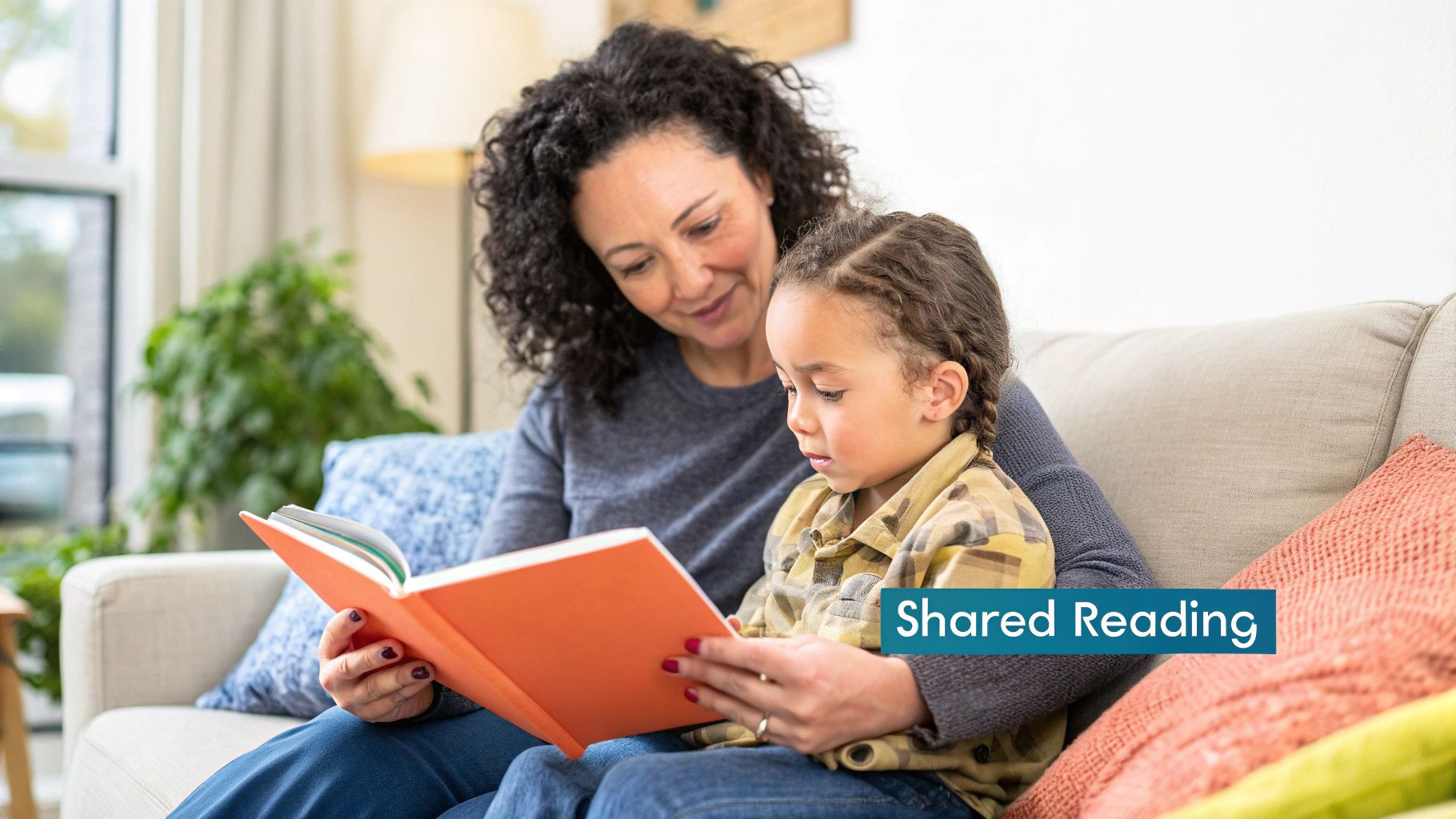
That secret weapon is a story. When a character in a book feels scared but finds a little piece of courage, it gives your child a roadmap for their own anxieties. Stories create a safe distance, allowing kids to explore tricky feelings like jealousy, frustration, or sadness without feeling like they're in the hot seat.
This powerful link between stories and emotional health is a cornerstone of emergent literacy. It’s about so much more than learning letters; it’s about learning to understand yourself and others.
From Storytime to Emotional Resilience
So, how does this actually work in the real world? When a child sees a character get angry and make a bad choice, then learn how to fix it, they internalize that mistakes are okay and feelings aren't forever. This builds emotional resilience—the ability to bounce back from challenges—which studies show is a key predictor of long-term well-being.
This is where interactive stories, like the ones in Lunesia, are pure gold. It's one thing to hear about a character being brave; it's another thing entirely to help them choose to be brave. By making decisions for characters facing dilemmas—like helping a shy friend speak up or dealing with a frustrating puzzle—children get to practice emotional regulation in a safe, fun space.
Imagine your child comes to a fork in a Lunesia adventure:
- Option A: Yell at the grumpy troll who blocked the bridge.
- Option B: Ask the troll what’s wrong and offer to help.
When they choose Option B and see a positive outcome, they're not just moving the plot forward. They're actively practicing empathy and problem-solving. This isn't just reading; it’s building a library of emotional strategies they can use in their own lives.
A Gentle Way to Tackle Life's Lessons
These kinds of value-rich journeys open up beautiful conversations about kindness, honesty, and empathy. They become a gentle, natural way for you to tackle life's big lessons together. Instead of a lecture about sharing, you can talk about that time they helped a character share their magical berries in a story.
If you want to explore this more, we have a wonderful collection of stories for coping with emotions that can help start these important conversations.
This process does more than just calm a tantrum. It teaches children that their feelings are valid, manageable, and that they have the inner strength to navigate them. It’s a gift of self-awareness that will last a lifetime.
And let’s be honest—there’s a huge bonus for you. While your child is immersed in a meaningful adventure, learning to be a kinder, more resilient little person, you get a few precious moments of guilt-free time for yourself. You can finally finish that coffee, knowing your child isn't just occupied—they're safe, happy, and growing in a world free of ads and distractions.
Your Child’s Path to Becoming a Lifelong Reader
Have you ever had that nagging feeling, wondering if you’re doing enough? In a world filled with developmental checklists, it’s easy to feel like preparing your child to read is a race you're already falling behind in. Let's just take a deep breath. Emergent literacy isn’t about winning a race; it’s about nurturing a deep, lasting love for stories.
The most important thing to remember is this: you are your child’s most important guide. Your excitement and the cozy moments you share curled up with a story are the real foundation of a lifelong reader. It’s not about performance; it’s about connection.
You Are Already the Perfect Guide
You don’t need a teaching degree or a color-coded curriculum. The simple, powerful ways you support your child are already part of your daily life. Every song you sing, every chat about their day, every silly story you invent together—each one is a seed you’re planting for a future love of learning.
This isn't just a hunch; it's a global priority. Educational experts recognize that early literacy skills are strong predictors of a child’s future achievement. The foundation you're building now is a critical piece of their later success, a concept supported by organizations like UNESCO.
You are not just teaching your child to read; you are giving them the keys to a world of imagination, empathy, and endless discovery. The greatest gift you can offer is your presence and your joy in sharing stories together.
Tools like Lunesia are here to support you, not replace you. Think of it as your trusted parenting partner. For those moments when you need to recharge, you can hand your child an interactive adventure, completely guilt-free. They won’t just be occupied; they’ll be in a safe, ad-free space, actively making choices that build their courage and kindness.
Fostering a Lifelong Love for Books
The ultimate goal here is to make reading feel like a treat, not a chore. A great way to build that positive association is by exploring fun family initiatives, like celebrating reading and books on National Read Across America Day.
By focusing on connection and play, you're giving your child the most powerful foundation of all. You're showing them that stories are a source of comfort, excitement, and a way to understand the world. And that is a lesson that will last a lifetime.
A Few Common Questions Parents Ask
As you start noticing all the little ways your child is getting ready to read, a few questions are bound to come up. It's totally normal. Think of this as our little coffee chat—let's walk through some of the biggest concerns I hear from parents, so you can feel confident and even excited about this stage.
At What Age Should My Child Start Learning to Read?
This is the big one, isn't it? The simple, reassuring answer is: there's no magic number. Emergent literacy is a gentle unfolding, not a race. Your child has been on this path since their very first days, just by listening to the sound of your voice.
Instead of getting hung up on a specific age for formal reading, try shifting your focus to nurturing a love for stories. Pressure can accidentally turn reading into a chore, but those shared, joyful moments build a passion that lasts a lifetime. Every child blossoms on their own timeline, and a happy, strong foundation is the best head start you can possibly give.
How Much Screen Time Is Okay for Early Learning?
It's one of the trickiest questions for parents today, and for good reason. The secret isn’t really about the quantity of screen time, but the quality. Just sitting and passively watching videos doesn’t do much for their development.
However, high-quality, interactive content can be an incredible learning tool. Apps like Lunesia are designed to be an active experience, not a passive one. When your child is making choices, figuring out puzzles, and using their imagination to move a story forward, their brain is firing on all cylinders. This kind of thoughtful screen time, used within healthy limits, becomes a powerful and guilt-free ally in your parenting toolkit.
What if My Child Hates Books?
First off, don't panic! This is far more common than you might think. If your child resists sitting down with a traditional book, it’s a sign to broaden your definition of "reading." The real goal is to create positive, happy experiences around stories—in whatever form they find exciting.
- Try audiobooks during car rides or while they're playing quietly.
- Tell stories out loud, making up silly adventures on the spot.
- Introduce interactive stories where they are the hero of the adventure.
This is where an app like Lunesia can be a total game-changer. When a child who "hates" books realizes they can actually control the action and be the star, their resistance often just melts away. You're not forcing them to read; you're inviting them to play. And through that play, you’re nurturing the exact skills that will one day make them a reader.
Ready to turn storytime into an unforgettable adventure? With Lunesia, your child doesn't just listen to stories—they live them. Give your child the gift of interactive tales that build kindness, courage, and a lifelong love of reading. Start your magical journey with Lunesia today!
